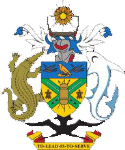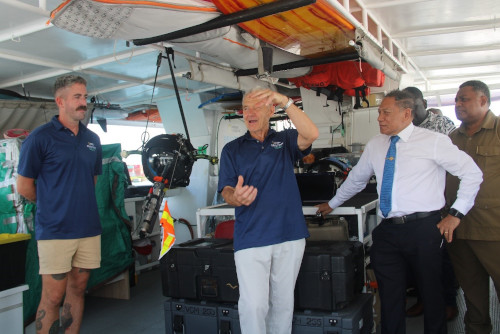The Government of the Solomon Islands has officially launched an expedition in collaboration with National Geographic Pristine Seas to assess the health of the nation's ocean from the shoreline to deep waters.
The launch event was attended by the Minister of Foreign Affairs and External Trade, Hon. Peter Shanel Agovaka and the Supervising Minister of Environment, Climate Change and Disaster Management (MECCDM), Hon. Rexon Ramofafia.
This month-long expedition will feature a team of local and international scientists and filmmakers. The boat is equipped with cutting-edge technology, to carry out the research aims to enhance understanding of the country’s nearshore marine ecosystems and advance ocean conservation efforts.
Scientists from relevant ministries will join the National Geographic Pristine Seas team aboard the research vessel to provide support and local expertise.
Minister Agovaka emphasized the importance of this collaboration, noting that science is needed to guide the Solomon Islands National Ocean Policy. Solomon Islands is blessed with rich marine biodiversity with significant ecological and economic importance.
He stated, “The marine spatial plan developed by Ocean 12, aims to achieve sustainable use and protect marine biodiversity. However, investing in scientific research is crucial to complement the invaluable indigenous knowledge of our coastal communities, which has shaped this plan.”
The partnership between the Solomon Islands Government and National Geographic Pristine Seas reflects a shared commitment to addressing these challenges. Minister Agovaka added, “Effective management of our unique marine biodiversity depends not only on the best available science matched by decisive and timely action.”
He expressed gratitude to National Geographic Pristine Seas for their support and collaboration in conducting this vital scientific expedition. “This expedition will provide critical data to bridge knowledge gaps, enhancing the Solomon Islands' capacity to manage and protect its ocean environment effectively, ensuring long-term sustainability and resilience.”
The expedition will focus on selected sites including Marau on southeast Guadalcanal, the Three Sisters Islands in the Makira-Ulawa Province, and several islands in the Temotu Province. The team will spend a month living and working aboard the Argo research vessel, employing a variety of methods—including deep-sea cameras, SCUBA dive surveys, seabird counts, underwater visual surveys, environmental DNA (eDNA) sampling, and micropaleo sampling—to assess the health of the ocean.

